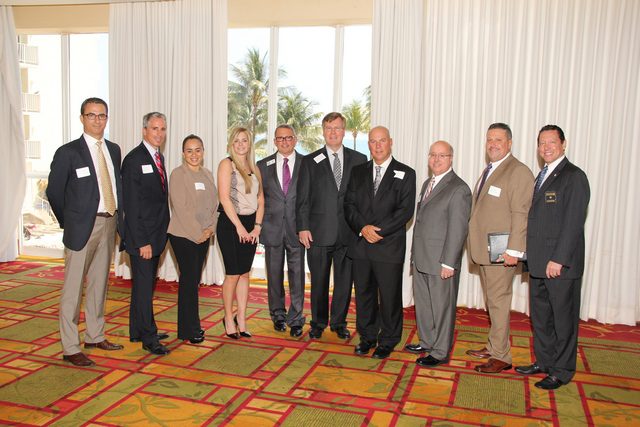

Jihad on the Web” was the topic of a recent Aventura Marketing Council Chairman’s Roundtable luncheon hosted by Hotwire Communications. The discussion was led by James Van de Velde, Ph.D., a lecturer of National Security Affairs at Georgetown and Johns Hopkins University and a consultant to the U.S. Intelligence Community, currently consulting with U.S. Cyber Command.
AMC Chair Cliff Schulman of Weiss, Serota, Helfman, along with Hotwire Communications executives Carl Lender, Marty Mohr, Steve Schmitz and Mark Hansen, welcomed guests at the Newport Beachside Hotel & Resort.
Lender invited and introduced the speaker, a longtime friend, who graduated high school with Van de Velde in Connecticut, along with Aventura Commissioner Howard Weinberg. Van de Velde went on to attend Yale University and the Fletcher School of Law and Diplomacy, where he completed a Ph.D. in National Security Affairs. He first joined the State Department and later became a U.S. Naval Intelligence Officer, before becoming an academic and consultant.
“James Van de Velde has served our country with distinction for more than 25 years,” Lender said. “He started his career as a nuclear weapons analyst and arms control negotiator and is now a consultant to the U.S. Intelligence Community, where he has worked with the National Counter Terrorism Center, the Department of Treasury, the FBI, the National Counter proliferation Center and now U.S. Cyber Command.”
“I’m here to discuss how all of our lives are affected by our communications infrastructure,” Van de Velde said. “I currently work for U.S. Cyber Command, which fights your computer warfare and defends the U.S. government’s communications’ network, and if necessary, attacks adversaries in cyberspace.”
Van de Velde argued that our lives live and die through cyberspace, now considered the ‘fifth domain of warfare,’ according to the U.S. Department of Defense. As both government systems and private individuals are increasingly linked by and dependent on the internet, the risk that terrorists and adversaries will use the internet against us as a means to unfairly brand us or worse attack us, for example, by turning off electrical grids or crashing crucial infrastructure systems, becomes increasingly real. Van de Velde explained, “Although al-Qaida today uses the internet as a means to advance its information operations – propaganda, recruitment, information sharing – it someday could create or be given more sophisticated cyber weapons from U.S. adversaries who wish to create ambiguous and asymmetrical warfare against the United States, perhaps to confuse or distract U.S. efforts worldwide.”
Further, Van de Velde claimed, terrorist groups have learned to exploit the Internet as a marketing tool to promote their worldwide messages and gain followers. According to Van de Velde, Jihadist websites are particularly effective at using the Internet for branding and marketing. “Al-Qaida maintains an enormous web presence, conducting information warfare every day by posting Jihadist videos and al-Qaida publications designed to inspire violence, recruit terrorists, plan and organize operations.”
To help defeat al-Qaida, Van de Velde said, industry, which largely owns the internet – a domain created by man — can play a crucial role by taking the lead to police the web from terrorist ‘pornography’ and repeated calls for violence. “Al-Qaida inspires violence, images of which it posts on the web as a form of ‘performance art,’ designed to intimidate and incite more violence,” Van de Velde claims. “But such imagery can be defeated by using the web to ‘counter-brand’ al-Qaida by, for instance, showing how many Muslims al-Qaida has killed and how the West has saved countless individuals from violence, famine, natural disasters and diseases around the world.”
Van de Velde’s own life was unfairly and devastatingly attacked when he returned from serving overseas with the State Department to teach at Yale. His life changed in December, 1998, when one of his students was tragically and brutally murdered and found at a street corner a half-mile from Van de Velde’s New Haven apartment.
Within a few days of the investigation into the murder, the local New Haven newspaper, quoting city and university sources, claimed Van de Velde was a suspect in the crime. The paper cited no evidence to support the claim, other than the unnamed sources.
Van de Velde lost his teaching position at Yale, eventually leaving New Haven and rebuilding his career over the next fifteen years as a career Foreign Service Officer and then consultant to the U.S. Intelligence Community. Concurrently, he brought four lawsuits against the media, the City of New Haven and Yale University to combat the media innuendo that dogged him in subsequent reports on the investigation. In June 2013, the City and Yale University settled the lawsuits against them out of court and the Connecticut State’s Attorney admitted to the New York Times that Van de Velde was not a suspect in the crime.
Velde’s professional and personal experience illustrates the perilous ways the internet can be manipulated to threaten lives and personal reputations everywhere. While Van de Velde was able to rebuild his life and career, he noted, “The web can consume us all if we’re not aware of and appreciate its power to influence and destroy.”
This was the first time that Van de Velde has spoken publicly about his 15-year personal and professional ordeal.





